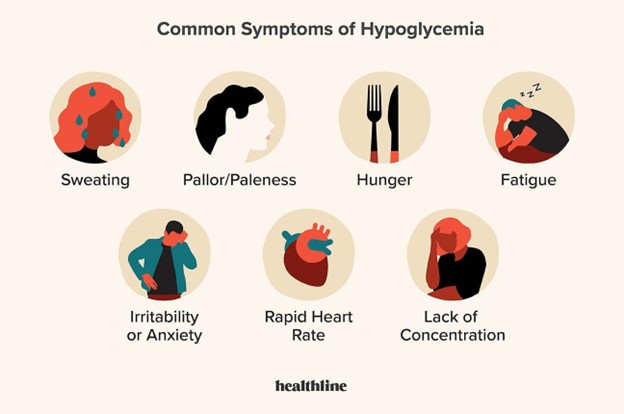The nurse should teach a diabetic client that which symptom is indicative of hypoglycemia?
Anorexia
Warm skin
Fruity breath
Nervousness
The Correct Answer is D
Choice A Reason: Anorexia is not a symptom of hypoglycemia, but it may indicate a loss of appetite due to other causes such as nausea, infection, or depression.
Choice B Reason: Warm skin is not a symptom of hypoglycemia, but it may indicate a fever, inflammation, or infection.
Choice C Reason: Fruity breath is not a symptom of hypoglycemia, but it may indicate ketoacidosis, which is a serious complication of hyperglycemia.
Choice D Reason: Nervousness is a symptom of hypoglycemia, as the low blood glucose level affects the brain and causes anxiety, irritability, confusion, and tremors.

Nursing Test Bank
Naxlex Comprehensive Predictor Exams
Related Questions
Correct Answer is A
Explanation
Choice A Reason: Determining the client's calcium level is the appropriate action for the nurse to take, as it may indicate hypocalcemia, which is a possible complication of thyroidectomy due to accidental removal or damage of the parathyroid glands. Hypocalcemia can cause muscle spasms, tingling, numbness, or tetany.
Choice B Reason: Monitoring the client's peripheral pulses is not the appropriate action for the nurse to take, as it does not address the cause of muscle spasms or provide any relief.
Choice C Reason: Administering IV normal saline solution is not the appropriate action for the nurse to take, as it does not correct hypocalcemia or prevent further complications.
Choice D Reason: Giving the client an oral potassium supplement is not the appropriate action for the nurse to take, as it may worsen hypocalcemia or cause hyperkalemia, which can affect cardiac function and muscle contraction.
Correct Answer is D
Explanation
Choice A Reason: High glucose level is not a finding that confirms bacterial meningitis, but it may indicate other conditions such as diabetes mellitus or hyperglycemia.
Choice B Reason: Low protein concentration is not a finding that confirms bacterial meningitis, but it may indicate other conditions such as malnutrition or liver disease.
Choice C Reason: Decreased CSF pressure is not a finding that confirms bacterial meningitis, but it may indicate other conditions such as dehydration or spinal cord injury.
Choice D Reason: Cloudy CSF is a finding that confirms bacterial meningitis, as it indicates that there is an infection and inflammation in the meninges that surround the brain and spinal cord.
Whether you are a student looking to ace your exams or a practicing nurse seeking to enhance your expertise , our nursing education contents will empower you with the confidence and competence to make a difference in the lives of patients and become a respected leader in the healthcare field.
Visit Naxlex, invest in your future and unlock endless possibilities with our unparalleled nursing education contents today
Report Wrong Answer on the Current Question
Do you disagree with the answer? If yes, what is your expected answer? Explain.
Kindly be descriptive with the issue you are facing.
